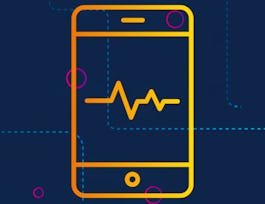This course focuses on data, evaluation methods and the economic evaluation of digital health interventions. This module focuses on key data considerations for digital health including data management, data visualisation and methods for evaluating digital health interventions. The key focus is on experimental and quasi-experimental design approaches that can be applied to evaluating digital health interventions and key considerations for the economic evaluation of digital health interventions.


Evaluation of Digital Health Interventions
This course is part of Digital Health Specialization
Taught in English
Some content may not be translated

Instructor: Ana Luisa Neves
3,859 already enrolled
Included with 
Course
(19 reviews)
Details to know

Add to your LinkedIn profile
5 quizzes
Course
(19 reviews)
See how employees at top companies are mastering in-demand skills

Build your subject-matter expertise
- Learn new concepts from industry experts
- Gain a foundational understanding of a subject or tool
- Develop job-relevant skills with hands-on projects
- Earn a shareable career certificate


Earn a career certificate
Add this credential to your LinkedIn profile, resume, or CV
Share it on social media and in your performance review

There are 4 modules in this course
During this week, the focus will be on data considerations for digital health. This will be illustrated through examples around electronic disease surveillance and strategies for the extraction of medical data and how to present it. We will get you to think about what aspects of this would be challenging in your own context. The focus of the module then moves onto data visualisation with key case studies and examples of how to interrogate large datasets to examples of data visualisation. There will be a specific activity for you to do in this module in Tableau on visualising data.
What's included
2 videos17 readings1 quiz4 discussion prompts1 plugin
In this week, you will learn about real world case studies to improve real-time data collection and monitoring for Ebola building and the use of process evaluation to evaluate this intervention. You will then hear about interesting ways that data can be routinely used in healthcare with examples from the UK National Health Service.
What's included
4 videos5 readings2 quizzes
This module focuses on methods for evaluating digital health interventions and you will focus on experimental and quasi-experimental evaluation approaches that can be applied to evaluating digital health interventions. You will then be introduced to real-world examples of some of these approaches and key considerations for randomised control trials. You will then focus on a specific example of methodological concerns of an evaluation of a digital medicine system, the limitations of this study and the NICE Evidence Framework.
What's included
3 videos8 readings1 quiz2 discussion prompts
In this week, you will learn about frameworks and models for evaluation, what robust trials are and examples of these, logic models and how to design a statistical analysis plan.
What's included
3 videos9 readings1 quiz1 peer review2 plugins
Instructor

Offered by
Recommended if you're interested in Public Health

Imperial College London

Johns Hopkins University

Imperial College London

Johns Hopkins University
Prepare for a degree
Taking this course by Imperial College London may provide you with a preview of the topics, materials and instructors in a related degree program which can help you decide if the topic or university is right for you.
Why people choose Coursera for their career




New to Public Health? Start here.

Open new doors with Coursera Plus
Unlimited access to 7,000+ world-class courses, hands-on projects, and job-ready certificate programs - all included in your subscription
Advance your career with an online degree
Earn a degree from world-class universities - 100% online
Join over 3,400 global companies that choose Coursera for Business
Upskill your employees to excel in the digital economy
Frequently asked questions
Access to lectures and assignments depends on your type of enrollment. If you take a course in audit mode, you will be able to see most course materials for free. To access graded assignments and to earn a Certificate, you will need to purchase the Certificate experience, during or after your audit. If you don't see the audit option:
The course may not offer an audit option. You can try a Free Trial instead, or apply for Financial Aid.
The course may offer 'Full Course, No Certificate' instead. This option lets you see all course materials, submit required assessments, and get a final grade. This also means that you will not be able to purchase a Certificate experience.
When you enroll in the course, you get access to all of the courses in the Specialization, and you earn a certificate when you complete the work. Your electronic Certificate will be added to your Accomplishments page - from there, you can print your Certificate or add it to your LinkedIn profile. If you only want to read and view the course content, you can audit the course for free.
If you subscribed, you get a 7-day free trial during which you can cancel at no penalty. After that, we don’t give refunds, but you can cancel your subscription at any time. See our full refund policy.

